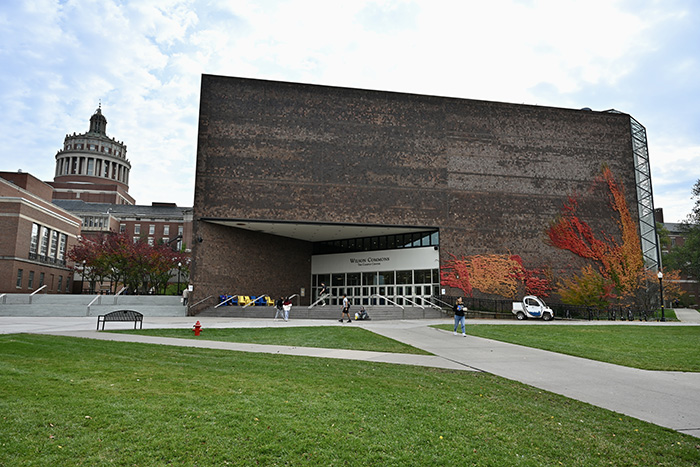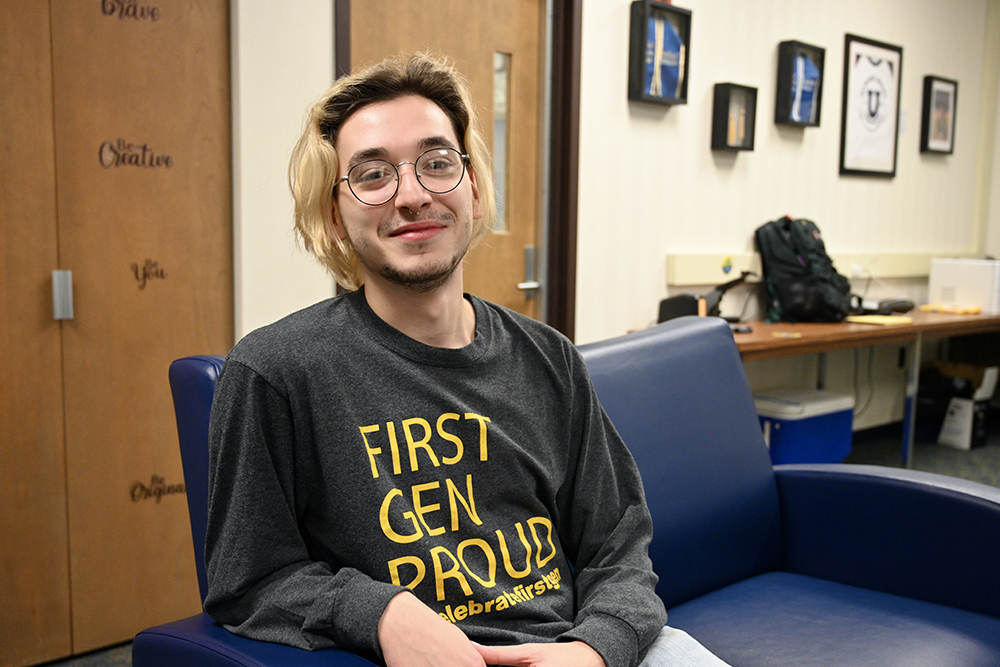Celebrating First-Generation Student Success at the University of Rochester

Doing anything for the first time can be scary, but it can be especially anxiety producing when you are the first in your family to do it. For all first-year college students, the college experience is a new one, but for first-generation college students, the college experience can hold a lot more weight. “To me, being first-gen means having to support myself and jumping through hoops others don’t have to,” says University of Rochester (UR) junior and McNair Scholar Dariel Guerra.
Guerra says he always wanted to go to college and when his sister became the first in the family to go, he wanted to follow in her footsteps. Guerra is majoring in Digital Media Studies and History and says he very much enjoys his work in the Ronald E. McNair Post-Baccalaureate Achievement Program administered through the David T. Kearns Center. This experience has allowed him to participate in research and has opened doors for internships and soon, graduate studies. Guerra says he is grateful for the help the Kearns Center has provided him through his higher education journey. “The sense of community fostered at the Kearns Center allows students to connect on uniquely first-gen experiences” Guerra says. Despite feeling strongly connected within a community, Guerra says his path has not always been a smooth one. “To get to the point, my experience as a first-gen student has been rocky. There have been ups and a lot of downs, but being familiar with resources on campus to help you is so important.” For Guerra, having a space like the Kearns Center is extremely beneficial, not only for the service the center provides but for the support the staff give to all students who come through its doors. “If it wasn't for the staff at the Kearns Center that have helped me, I probably wouldn't still be at UR (and the reasons for that are not academic, they are purely economical)” Guerra says.

Photo: Alexa Olson, University of Rochester
The Kearns Center is the Academic Home to First-Generation College Students
There are many supports for first-gen students at the University of Rochester including the David T. Kearns Center, which is the academic home to first generation college students at the university. The Kearns Center was given the designation back in 2017 by then Dean of the College of Arts, Sciences & Engineering Dr. Richard Feldman. Dr. Beth Olivares, Associate Vice Provost for Academic Equity and Executive Director of the Kearns Center says Feldman was really focused on increasing the graduation rates for all students. “We did some research and learned that in addition to the rates being lower for some low-income and most URM (underrepresented minority) students, those who were first in their families to pursue a bachelor’s degree were also at risk. Knowing that the Center had worked very successfully with first-generation students even prior to its inception (starting in 1992, with the funding of the Ronald E. McNair Post-Baccalaureate Achievement Program), Feldman believed that the Center was a natural place to designate as the academic home to first-gen students,” Olivares says.
On the national level, one in three undergraduates identifies as first-gen, and according to data from the Center for Fist-Generation Student Success, an initiative of the National Association of Student Personnel Administrators, or NASPA, first-gen students are more heavily representative of historically marginalized groups, something that Olivares says, comes as no surprise. “A disproportionate number of low-income individuals are underrepresented minorities; Black and brown people were only allowed to go to college after the passage of the Civil Rights Act in 1964. The Civil Rights Act only opened the way, by making it illegal for colleges to discriminate on the basis of ethnicity—it wasn’t only until fairly recently, I would argue, that universities and colleges have begun to be prepared to support these students as much and as well as they do white upper- and middle-class students who have always been their students.”
Because more first-generation college students tend to be from low-income households as compared to those not identifying as first-gen, financial security can be a huge motivator for students according to Olivares. “Education is really, truly authentically, in America, a way out of poverty.” Olivares says she understands the unique challenges first-gen students face, and what it means to come from a low-income household – as she herself shares that experience. Olivares says she struggled with poverty as a young person and dropped out of college in her sophomore year at Fordham University after she got married and then got pregnant with her daughter. “Four years later, I had a son, and felt a huge yearning both to go back to school, but mainly, to use my mind in other ways while enmeshed in poverty. When I went back to Fordham, five years after dropping out, I had a whole other set of motivations and an understanding of the need for higher education as a means out of poverty.”
Kearns Center Staff have Shared Experiences
Olivares isn’t the only one whose experiences foster a deep level of understanding and thoughtfulness around their work. The staff at the Kearns Center all share unique perspectives that help strengthen and support the work they do, especially when it comes to supporting students. “The Kearns Center employs a holistic advising model” says Assistant Director for College Programs, Melissa Raucci. “We understand that things outside of academics impact the experiences of our students. Asking questions about financial aid, student organizations, family, and friendships, is vital to getting to know how our students experience our campus. Building personal relationships with students gets them to invest, to show up, and utilize our support system, ultimately helping them reach their goals.” Raucci has been working at the Kearns Center for over 10 years and says one of the strongest aspects of the work the Kearns Center does, is to build strong connections with students. She says when students feel connected on all levels, they show up, and showing up can make all the difference when it comes to student success.
Several of the staff members at the Kearns Center are first-generation college graduates, including Director of the Kearns Center, Dr. Miguel Baique. Baique says he struggled academically during his first few weeks of college. “There were times when I thought I was not fit for higher education, but I did not want to give up, I had a lot of people counting on me. I had to try different techniques to improve my academics; I needed to learn how to learn. This was all happening while I was still trying to figure out ‘who I was’ in this new space…” Baique says his college experience helped him learn so much, not only about himself but how he wanted to take what he had been learning and affect change, especially in academic spaces. “Higher education changed me (quite drastically), providing me with critical thinking skills and a social consciousness that would eventually lead me to the work I do today.” Baique says he looks forward to working alongside stakeholders who have similar stories and identities as he does, and who are eager to remove the barriers so many historically excluded populations have faced. “The system is slowly changing to ensure that students feel supported and feel a sense of belonging on campus. Specifically at the University of Rochester, I know the Kearns Center has been a significant contributor to that change.”
